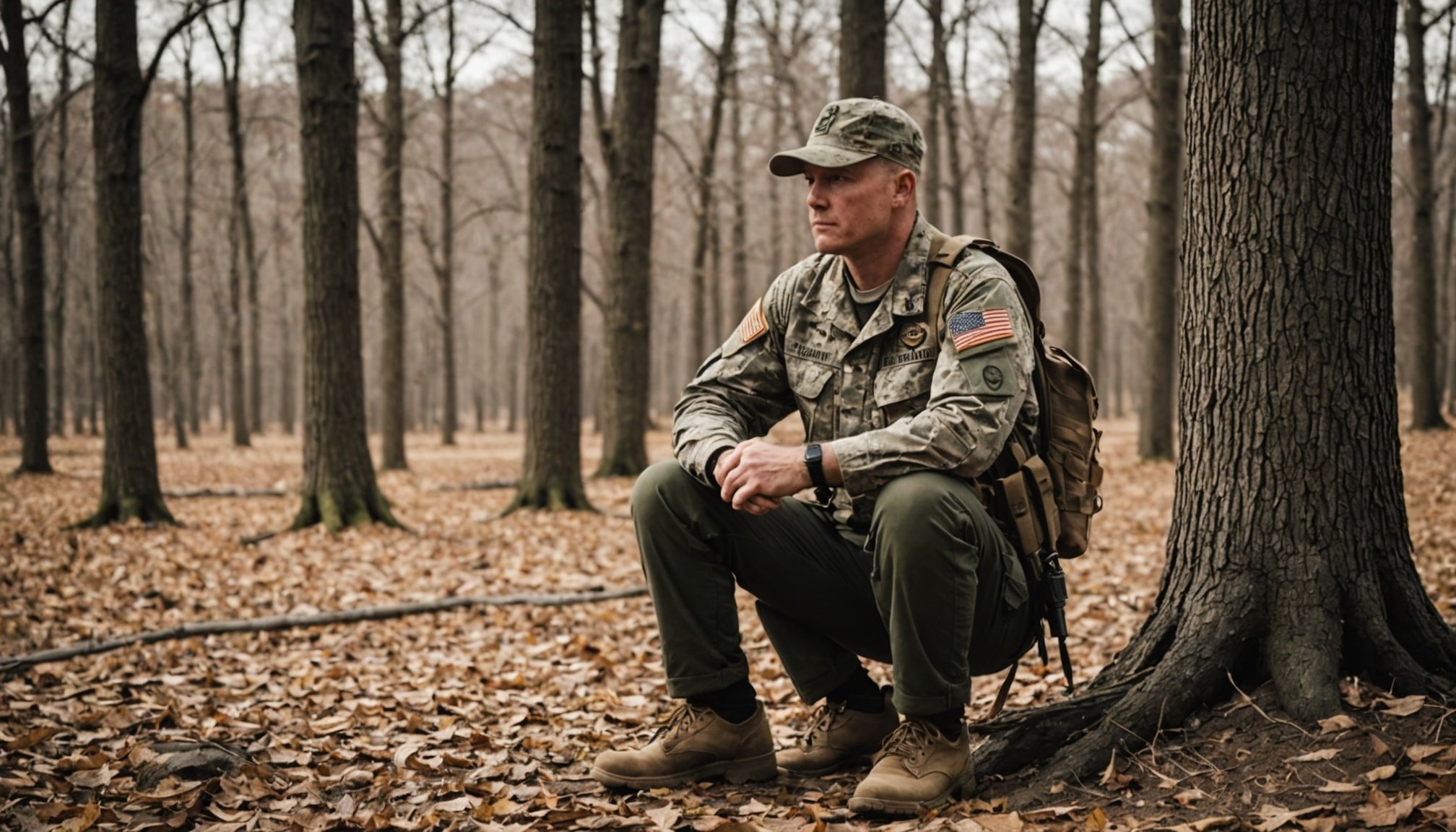Unlocking Healing: The Impact of Narrative Therapy on Veterans Battling PTSD
Understanding PTSD and Its Impact on Veterans
Post-Traumatic Stress Disorder (PTSD) is a debilitating condition that affects many veterans who have experienced traumatic events during their service. The symptoms of PTSD can be overwhelming, including flashbacks, nightmares, severe anxiety, and uncontrollable thoughts about the trauma. For veterans, these symptoms can be particularly challenging, affecting not only their mental health but also their relationships, daily functioning, and overall quality of life.
Veterans often face unique challenges in seeking help for PTSD. The stigma associated with mental health issues, the difficulty in adjusting to civilian life, and the complexity of their traumatic experiences can make traditional therapy approaches less effective. This is where narrative therapy steps in, offering a powerful and holistic approach to healing.
Topic to read : Unlocking the Advantages of Deep Pressure Stimulation for People with Autism: A Comprehensive Guide
What is Narrative Therapy?
Narrative therapy is a form of psychotherapy that focuses on the power of storytelling and language in shaping individuals’ lives and identities. Developed by Michael White and David Epston in the 1980s, this therapy recognizes that people construct stories about themselves and their experiences, which in turn shape their identity and influence their actions and beliefs.
In the context of PTSD, narrative therapy helps veterans to separate themselves from their traumatic experiences, enabling them to examine their struggles more objectively. Here are some key techniques used in narrative therapy:
Topic to read : Unlocking the Potential of Telemedicine for Effective Management of Chronic Skin Disorders
- Externalizing Conversations: Treating problems as separate entities from the person experiencing them. This helps individuals to view their problems as external forces that can be examined and addressed.
- Re-authoring: Actively rewriting and reframing individuals’ narratives about themselves, highlighting their strengths, values, and preferred ways of being.
- Re-membering: Exploring and bringing to light forgotten or overlooked aspects of an individual’s life that may hold significance or provide alternative perspectives.
- Restorying Conversations: Collaboratively reimagining and retelling significant events or experiences from a different perspective, focusing on strengths and reframing the meaning of these events.
How Narrative Therapy Helps Veterans
Narrative therapy is particularly effective for veterans because it addresses the complex and deeply personal nature of their traumatic experiences. Here are several ways in which narrative therapy can help:
Creating a Safe and Supportive Environment
Narrative therapy emphasizes the creation of a safe, supportive environment where veterans can explore their traumatic experiences without fear of judgment. This environment is crucial for building trust and fostering a sense of safety, which is often lacking in veterans who have experienced trauma.
Empowerment Through Storytelling
By helping veterans to reframe their stories, narrative therapy empowers them to view themselves as more than their traumatic experiences. This process of re-authoring allows veterans to regain control over their narratives, separating their identity from the trauma they have endured.
"Narrative therapy helps clients reshape the stories they tell about their trauma, allowing them to separate their identity from the traumatic events. Through this process, clients re-author their life narratives, empowering them to view themselves as more than their trauma."
- Source: CarePatron
Fostering Resilience and Coping Mechanisms
Narrative therapy focuses on the strengths and resources of the individual, rather than solely on their problems. By highlighting these strengths, veterans can develop more effective coping mechanisms and build resilience, which is essential for managing PTSD symptoms.
Community and Group Support
Programs like the Warrior Camp® by Trauma and Resiliency Resources (TRR) integrate narrative therapy within a community setting. This approach involves group activities and a supportive community, which is vital for veterans who often find healing in the acceptance and understanding of fellow soldiers and civilians.
Examples and Success Stories
The impact of narrative therapy on veterans can be seen through various success stories and testimonials. Here are a few examples:
Warrior Camp® Testimonials
Veterans who have participated in the Warrior Camp® program, which includes narrative therapy among other modalities, have reported significant improvements in their mental health and overall well-being.
"I participated in the warrior camp at a very trying time of my life. The resources put at my disposal were very advanced and effective. Each day great progress was made by the whole crew and the energy and encouragement carried us through many months after."
- Testimonial from a veteran who attended Warrior Camp®
Personal Transformation
Narrative therapy can lead to profound personal transformations. By reframing their stories, veterans can find a new sense of purpose and meaning in their lives.
"I no longer feel suicidal thank you... I came to believe in a power greater than myself, no longer do I reach for the bottom shelf. Made a decision to turn over my will, easing my heart and allowing my mind to be still."
- Testimonial from a combat veteran who benefited from TRR's programs
Practical Insights and Actionable Advice
For veterans considering narrative therapy, here are some practical insights and actionable advice:
Finding the Right Therapist
It is crucial to find a therapist who is experienced in narrative therapy and understands the unique challenges faced by veterans. Look for therapists who have worked with veterans and have a track record of successful outcomes.
Building a Support Network
Narrative therapy often involves a community or group setting. Building a support network of fellow veterans and supportive civilians can enhance the healing process.
Being Patient and Persistent
Healing from PTSD is a journey that requires patience and persistence. Narrative therapy is not a quick fix but a process that involves gradual progress and self-discovery.
Comparison with Other Therapies
Here is a comparison between narrative therapy and other commonly used therapies for PTSD:
| Therapy Type | Key Techniques | Focus | Effectiveness |
|---|---|---|---|
| Narrative Therapy | Externalizing conversations, re-authoring, re-membering | Empowerment through storytelling, separating identity from trauma | High client satisfaction, improved recovery outcomes |
| Exposure Therapy | Prolonged exposure to traumatic memories, cognitive restructuring | Reducing avoidance behaviors, changing negative thoughts | Effective in reducing PTSD symptoms, but can be intense and triggering |
| Cognitive Behavioral Therapy (CBT) | Identifying and changing negative thought patterns, behavioral experiments | Symptom reduction, coping skills | Widely used and effective, but may not address underlying trauma as deeply |
| EMDR Therapy | Eye movement desensitization and reprocessing | Processing traumatic memories, reducing symptoms | Highly effective for PTSD, especially when combined with other therapies |
The Future of PTSD Treatment: Integrating Narrative Therapy
As the field of mental health continues to evolve, the integration of narrative therapy into comprehensive treatment plans for PTSD is becoming increasingly recognized. Here are some trends and future directions:
Virtual Reality and Narrative Therapy
The use of virtual reality (VR) in therapy is a growing trend. Combining VR with narrative therapy could provide a more immersive and engaging experience for veterans, helping them to confront and reframe their traumatic experiences in a controlled environment.
Community-Based Programs
Programs like Warrior Camp® by TRR are setting a precedent for community-based treatment approaches. These programs integrate multiple therapy modalities, including narrative therapy, within a supportive community setting, which is crucial for the holistic healing of veterans.
Narrative therapy offers a powerful and holistic approach to healing for veterans battling PTSD. By focusing on the power of storytelling and the re-authoring of life narratives, this therapy helps veterans to separate their identity from their traumatic experiences, regain control over their lives, and build resilience.
For those who have served, the journey to healing is often long and challenging, but with the right support and therapeutic approaches, it is possible to unlock a path towards healing and a renewed sense of purpose.
"Narrative therapy provides a unique framework for understanding and addressing personal challenges and emotional struggles. It recognizes that people construct stories about themselves and their experiences, which shape their identity and influence their actions and beliefs."
- Source: CarePatron
By embracing narrative therapy and other complementary therapies, we can provide veterans with the tools they need to heal, to find peace, and to rediscover their place in the world.











